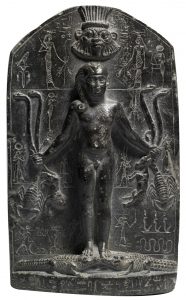
As you cozy into your COVID cocoon, snug as a bug in a rug, now’s the time to think about crocodiles. They can’t get you now – you’re inside!
In Ancient Egypt that might not have helped, because crocodiles were kept as pets. They wore jewelry and had special piercings to display their jewelry. Crocodile Body Piercer: there’s a high risk occupation. I wonder if it was considered “essential business” during a fever epidemic. You can bet the Egyptians didn’t close the houses of worship for a little plague. They would be earnestly supplicating the divine temple crocodile Petsuchos – a living, breathing god incarnate – for relief.
River crocodiles are wily hunters who have been observed hunting in tandem. Sometimes they cower with brush on their snouts hoping to lure birds seeking nesting materials. They have good memories and monitor the routines of prey animals. Crocodiles clamp their victims in powerful jaws and hold them underwater until they drown. (Crocs themselves can stay underwater several hours.) Then they dismember the bodies by thrashing in the water until the pieces are small enough to swallow.
Crocodiles lay their eggs on land near water and cover them with grass, mud, or sand to protect from the heat. Then the mother crocodiles rest close by to guard the nest. When the babies are ready to hatch, they mew inside their eggs. As they emerge, the mother carries them in her snout to the water. She will protect them from predators while they are small.
Crocodilians have a lot of patience, and spend much of their lives waiting around for eggs to hatch or a meal to appear. This is a magical quality in much demand at the moment, as we wait for the pandemic to subside. More crocodile magic can be found in my book Divining with Animal Guides.
